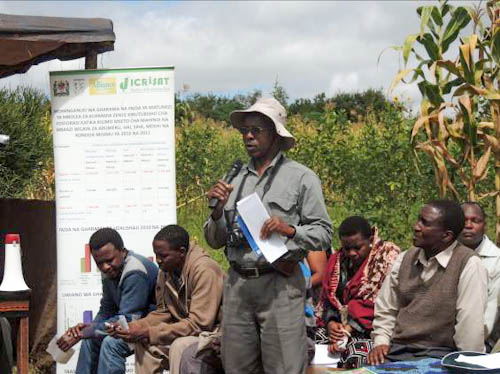RISING voices: Festo Salehe Ngulu, consultant agronomist, Tanzania

Festo Salehe Ngulu was born in Mwanga District, Kilimanjaro region, Tanzania. Initially he studied general Agriculture (Diploma and BSc). Thereafter he focused on plant pathology by studying an MSc in Plant Pathology and a Diploma in Seed Pathology.
He worked with the Ministry of Agriculture in Tanzania as a researcher; primarily engaged in identification of plant disease cases and development of cost effective and environmentally friendly disease management protocols. He did his research work in four crop research programs: sisal, cotton, coffee and common beans.
Apart from research engagements, he was also involved in dissemination of elite bean varieties (both bush types and climbing beans) in northern Tanzania as well as building the capacity of extension staff and farmers on issues related to management of plant diseases.
He has been with Africa RISING in Tanzania as a consultant (agronomist) since March 2013. His main task is coordination of on-farm research activities in Babati District. At the moment there are eight work packages being implemented. Most of the team members are new to the district and do not live in Babati. On the other hand, credible agricultural research demands not only selection and testing of relevant technologies but also appropriate testing sites and timely field operations. To have impact, it must be demand-driven and take into account social-cultural values and needs of the targeted community. Under such a scenario, it is vital to have someone on the ground, to effectively link researchers with local authorities, farmers/key stakeholders and to advice on correct timing of field operations; to ensure timely and smooth conduct of the project. This is what Ngulu is doing in his current position as a consultant-agronomist
What most motivates you to do what you do?
Having been a researcher, I see an opportunity of emancipating resource-poor smallholder farmers out of poverty though this project. Africa RISING has a unique approach that taps expertise from a multidisciplinary team to conduct stepwise integration of sustainable intensification innovations for addressing challenges along the value chain. I believe this is the best and most effective way of taking the technologies ‘out of the shelves’ to the resource poor farmer, an approach bound to impact positively on their livelihoods.
What do you find unique about Africa RISING?
Unlike most projects, Africa RISING’s approach combines all the key premises for stimulating sustainable adoption and ultimately impact. A multidisciplinary team of researchers to address challenges at household/landscape level, engagement of local authorities/targeted beneficiaries in validating candidate innovations, stepwise integration of innovations, feedback meetings at end of the season, invitation of farmers and local leaders to field days and institutionalization of a district research for development platform.
What do you most want to accomplish in your work?
Effective and amicable relationships between researchers and local authorities/farmers, a functional research for development (R4D) platform, and positive change in farmers’ mindset towards new innovations, especially towards industrial fertilizers and forage species. Traditionally farmers do not consider fodder species as ‘a crop’; for example the way they would treat maize and they claim that mineral fertilizers ‘ruin’ the soil!





Latest Comments